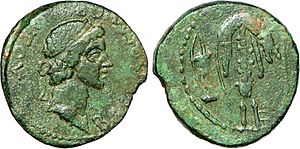Tiberius Julius Mithridates facts for kids
Quick facts for kids Mithridates III |
|
|---|---|

Coinage of Tiberius Julius Mithridates
|
|
| King of the Bosporan Kingdom | |
| Reign | 38–45 AD |
| Predecessor | Aspurgus |
| Successor | Cotys I |
| Died | 68 AD |
| House | Mithridatid |
| Father | Aspurgus |
| Mother | Gepaepyris |
| Religion | Greek Polytheism |
Tiberius Julius Mithridates Philogermanicus Philopatris, also known as Mithridates III of the Bosporus (lived around 41 AD, died 68 AD), was a king who ruled the Bosporan Kingdom. This kingdom was a "client state" of the Roman Empire, meaning it was independent but followed the rules of the powerful Roman Empire. His name Philopatris means "lover of his country."
Contents
The Life of King Mithridates
We don't know much about Mithridates' early life. When his father, Aspurgus, died in 38 AD, Mithridates became a co-ruler with his mother, Gepaepyris.
Becoming King of the Bosporus
Before 45 AD, the Roman Emperor Claudius gave Mithridates full control of the Bosporan Kingdom. Claudius officially recognized him as the rightful king.
However, in 45 AD, for reasons we don't know, Emperor Claudius removed Mithridates from his throne. Claudius then made Mithridates' younger brother, Cotys I, the new king. Claudius also pulled most of the Roman soldiers out of the Bosporan Kingdom. Only a few Roman military groups, called cohorts, were left behind with a Roman knight named Gaius Julius Aquila.
Mithridates Tries to Regain His Throne
Mithridates was very unhappy about being removed from power. He didn't trust his brother Cotys I or Aquila. He decided to try and get his kingdom back.
Mithridates was clever and managed to convince leaders of local tribes and soldiers who had left their armies to join him. He took control of these local groups and gathered an army. He was ready to declare war on Cotys I and Aquila.
When Cotys I and Aquila heard about Mithridates' army, they were worried an attack was coming soon. Both knew they had the strong support of Emperor Claudius.
Mithridates and his army fought against Cotys I's army and Aquila's soldiers. This war lasted three days near the Don River. In the end, Cotys I and Aquila won the battle without being harmed.
An Appeal to Emperor Claudius
Mithridates realized that fighting anymore was pointless. He thought about asking Emperor Claudius for help. Mithridates turned to a local tribal leader named Eunones for support.
Eunones sent messengers, called envoys, to Rome with a letter from Mithridates for Emperor Claudius. In his letter, Mithridates greeted the Emperor with great respect, like one ruler talking to another. Mithridates asked Claudius for forgiveness and begged not to be paraded in a victory march or put to death.
Emperor Claudius wasn't sure how to deal with Mithridates. Mithridates was captured and brought to Rome as a prisoner. He was shown to the public in the Roman Forum, standing next to a platform with his guards. He remained calm and showed no fear.
Claudius was impressed by Mithridates' plea for mercy in his letter. He decided to let Mithridates live. Mithridates was not put to death but was sent away from Rome to live in exile. He lived out his life in exile, without much money, until he died. He is not known to have had a wife or children.
See also
 In Spanish: Mitrídates II del Bósforo para niños
In Spanish: Mitrídates II del Bósforo para niños
 | Selma Burke |
 | Pauline Powell Burns |
 | Frederick J. Brown |
 | Robert Blackburn |

